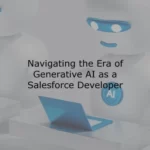The Crucial Role of Digital Skills in Shaping Our Future Workforce
In today’s digital-first world, children are learning coding before cursive writing, and these skills are now considered essential rather than specialized. Digital skills encompass the ability to utilize digital devices, communication applications, and networks to access and manage information. They enable effective communication, collaboration, content creation, and problem-solving in a work-anywhere environment.
The rise of digital skills is viewed as a necessary adaptation to the evolving technological landscape. To bridge the gap between current skill levels and future demands, companies can take proactive measures such as providing training and development programs, fostering a culture of continuous learning, and leveraging technology to enhance productivity and innovation.
Salesforce conducted research and consulted with experts to gain insights into digital skills, their significance, and their impact on the workforce. This article aims to provide an overview of digital skills, addressing common questions and sharing relevant research findings.
What are digital skills?
Digital skills refer to the abilities needed to use digital devices, communication applications, and networks for accessing and managing information. They involve tasks like online searching, emailing, programming, and development. These skills enable effective communication, collaboration, content creation, and problem-solving in today’s work-anywhere world.
Examples of digital skills include:
- Basic computer literacy: Understanding how to use computers, operating systems, and common software applications.
- Internet proficiency: Navigating the internet, conducting online searches, and using web browsers effectively.
- Email communication: Composing, sending, and managing emails, as well as understanding email etiquette.
- Digital collaboration: Using online tools and platforms to collaborate with others, such as project management software, video conferencing, and shared documents.
- Social media management: Understanding how to create and manage social media accounts, engage with others, and leverage social media for various purposes.
- Data analysis: Gathering, analyzing, and interpreting data using digital tools and software.
- Programming and coding: Writing and understanding programming languages to develop software, websites, and applications.
- Cybersecurity awareness: Knowledge of online security practices, including protecting personal information and identifying potential threats.
- Digital marketing: Utilizing digital channels to promote products or services, including search engine optimization, social media marketing, and content creation.
- Artificial intelligence and automation: Familiarity with AI technologies and automated processes, including machine learning, chatbots, and robotic process automation.
These are just a few examples, and digital skills can vary depending on industry and job roles. It’s important to continually update and expand digital skills as technology advances.
The Importance of Digital Skills in Today’s World
The COVID-19 pandemic has accelerated the ongoing digital transformation, leading to permanent changes in various aspects of our lives, including work and shopping. This rapid shift has significantly impacted the demand for digital skills, as companies have transitioned from physical offices to a digital-first mindset.
Although the trend of digitalization has been gaining momentum across industries for years, the current acceleration is unparalleled. Today, the ability to adapt to digital technologies and possess the necessary digital skills is crucial for securing stable and sought-after careers in the technology sector. In fact, these skills are essential for the survival and success of businesses in the modern landscape.
The importance of digital skills in the business world and the workforce has never been more evident, given the widespread adoption of digital-first interactions such as remote work, online commerce, and virtual collaboration. While this shift has brought numerous advantages like increased flexibility for employees and the removal of geographical barriers in talent acquisition, it has also widened the existing skills gap.
Understanding the Digital Skills Gap
In essence, the digital skills gap refers to the insufficient number of individuals possessing the necessary digital skills to drive companies’ present and future transformations. This gap is widening due to numerous factors, including:
- Tech talent surpasses the already limited supply, with 54% of American workers believing that technology will advance faster than workforce skills.
- The emergence of new technologies amplifies the demand for digital skills.
- High costs and disorganized educational approaches hindering learning and increasing barriers to skill development.
- Limited access to digital infrastructure and skills resulting from socio-economic disparities.
The economic implications of the digital skills gap are significant. Research conducted by Salesforce and RAND Europe highlights its disruptive impact on business growth, projecting potential cumulative GDP growth losses of $11.5 trillion for 14 G20 countries.
However, the democratization of digital skills does not occur uniformly across countries, industries, and communities. The skills gap will persist until individuals from underserved and underrepresented backgrounds gain equitable access to technology and education for reskilling. In the new digital-first world, the achievement of success, prosperity, and equality relies on ensuring that everyone possesses the necessary skills to actively participate.
Nurturing Digital Skills for the Future
Digital skills have become increasingly important as new technologies have emerged and transformed various industries. While email was once a new concept, technologies like blockchain, AI, and the cloud are now mainstream, leading to a significant increase in the demand for digital skills in Europe and the United States.
However, learning new digital skills can be overwhelming, especially without guidance or access to resources. Many individuals face barriers due to the cost and limited availability of traditional four-year degree programs. Recognizing these challenges, micro-degrees have emerged as a solution. These online degrees focus on specific areas of study and can quickly provide individuals with the necessary skills for jobs in fields like IT. Micro-degrees offer an alternative path that reduces the burden of student debt.
Moreover, micro-degrees can benefit individuals already working within industries or those seeking career changes. Platforms like Trailhead, provided by Salesforce, offer free online learning opportunities to acquire skills relevant to the Salesforce ecosystem. The Trailblazer Community facilitates peer-to-peer knowledge sharing and support, accelerating the learning process.
Salesforce, under the leadership of its Chair and CEO Marc Benioff, recognizes that success doesn’t solely depend on a college degree. They believe that individuals without degrees can create significant value for the world. Salesforce supports the development of digital skills through various platforms, projects, initiatives, and investments. These efforts aim to provide opportunities for individuals from diverse backgrounds to progress their skilling journeys and secure fulfilling and transformative employment.
Salesforce achieves this by offering free training through Trailhead, fostering the Trailblazer Community, establishing partnerships with leading education providers, and implementing apprenticeship programs, grants, and philanthropic initiatives on an international scale.
Working with partners
According to the 2021 IDC study, the ecosystem of Salesforce partners providing cloud services to customers is currently five times larger than Salesforce itself. However, this ecosystem is projected to grow even further and become more than six times larger by 2026. The growth of Salesforce’s partner ecosystem plays a significant role in driving the expansion of the Salesforce Economy. The study highlights the substantial impact and potential for growth within the ecosystem, contributing to the overall success and continued growth of Salesforce.
Empowering Job Creation and Cultivating Future Digital Leaders
Salesforce actively collaborates with educators worldwide to promote the teaching of digital skills to meet the needs of the current workforce. As part of this effort, Salesforce offers apprenticeships to young adults from underserved and underrepresented communities, providing them with valuable opportunities to develop their skills.
To attract and nurture talent, Salesforce has established the Futureforce University recruiting program. This program focuses on recruiting, retaining, and fostering the growth of graduate talent, ensuring a pipeline of skilled individuals for the future.
The Trailblazer Community is a vast network comprising 15 million individuals within the Salesforce ecosystem. This community serves as a platform for mutual support, enabling members to learn new skills and thrive with Salesforce. With an online platform accessible from anywhere, as well as over 1,300 active regional and interest-based groups worldwide, the Trailblazer Community facilitates knowledge sharing and collaboration. Through Trailblazer Mentorships, individuals can connect with mentors who provide guidance and help them secure their desired roles within the Salesforce ecosystem. Importantly, this initiative welcomes individuals at all levels, regardless of whether they possess a degree or prior Salesforce work experience.
Enhancing Workforce through Development Programs
Salesforce is committed to empowering individuals and organizations by providing various initiatives and resources to develop digital skills and bridge the workforce skills gap. Here are some of their key programs:
- Salesforce Talent Alliance: This initiative connects partner companies with a diverse pool of Salesforce-trained candidates, facilitating the development of a skilled workforce for the future.
- Pathfinder Training Program: Launched in collaboration with Deloitte, this program focuses on workforce development by providing training in technical, business, and soft skills required for a career in the Salesforce ecosystem.
- Salesforce Military: This program offers free online training and certification exams for active-duty military personnel, veterans, and military spouses, helping them acquire valuable skills and connect with partner companies for employment opportunities.
- Trailblazer Connect: Through events and online resources, Trailblazer Connect enables individuals to access mentorship and career opportunities, supporting their professional growth in the Salesforce ecosystem.
- Salesforce.org: Salesforce.org supports nonprofits and schools in their efforts to bridge the opportunity gap through education, following Salesforce’s 1-1-1 model.
In addition to these initiatives, online learning platforms such as LinkedIn Learning, Pearson, Edraak, Coursera, Udemy, and Skillshare offer access to a wide range of in-demand skills, allowing individuals worldwide to acquire specific skills and pursue economic opportunities.
With the growing importance of digital skills in a digital-first world, it is crucial for companies to provide support for upskilling and reskilling. Through these comprehensive digital skills development programs and offerings, Salesforce aims to drive success and equality for all.

Chinmay Bonde
Marketing Operations Manager
As a Marketing Operations Manager at Cloudalyze, I take care of content marketing, digital marketing, & graphic design. I also have the opportunity to collaborate cross-departmentally to improve internal marketing processes, create marketing enablement strategies, and weigh in on our go-to-market strategy. My life at Cloudalyze allows me to do a variety of things but being able to grow in a Salesforce Partner organization with the best talent and a revolutionary solution is what makes this a labor of love for me. As an operations manager at Cloudalyze, some of the things I look for in my work here is a belief, curiosity, creativity, tenacity, a strong work ethic, provocative thinker, and a strong personality.



